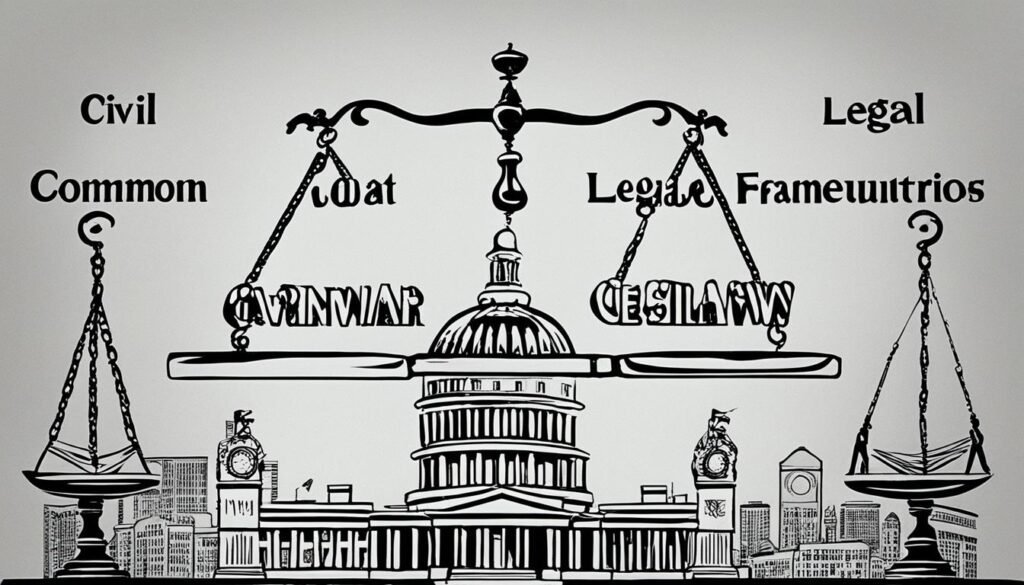For individuals seeking to understand the complex and fascinating world of law, this guide offers a comprehensive introduction to the foundations of legal systems. Whether you’re a prospective law student, a lawyer looking to expand your knowledge, or simply someone curious about the intricacies of the legal landscape, this overview will provide you with a solid foundation to navigate the study of law and its various practice areas.
The legal system serves as the backbone of our society, governing the interactions between individuals and organizations, as well as the relationship between the government and its citizens. From property law to criminal law, from international law to constitutional law, the breadth and depth of the legal field is truly vast. This guide will take you on a journey through the key components of legal systems, the sources of law, the common law vs. civil law distinction, and the process of legal education and training.
By the end of this introduction, you will have a solid understanding of the legal landscape, equipping you with the necessary knowledge to make informed decisions about your law school journey or to deepen your appreciation for the critical role that law plays in shaping our society. So, let’s dive in and explore the foundations of legal systems together.
Key Takeaways
- The legal system encompasses the framework of laws, institutions, and procedures within a jurisdiction.
- The primary sources of law in the United States include constitutional law, statutory law, administrative regulations, and common law.
- The study of law serves important purposes, such as providing a foundation for understanding legal reasoning and analysis, as well as preparing individuals for various legal careers.
- Lawyers can specialize in a wide range of practice areas, including civil law, criminal law, business and corporate law, and international law.
- Legal professionals are subject to rigorous ethical standards and professional responsibilities that guide their conduct.
Understanding Legal Systems
The legal system is the fundamental framework of laws, institutions, and procedures that govern a particular jurisdiction, such as a country or state. It encompasses the rules and regulations that shape the behavior of individuals and organizations within that jurisdiction, providing a foundation for society to function. Understanding the intricacies of legal systems is crucial for law graduates, legal professionals, and anyone seeking to navigate the complex landscape of legal studies and legal training.
What is a Legal System?
A legal system is the overarching structure that outlines the laws, regulations, and administrative processes within a specific geographical or political entity. It defines the rights, obligations, and responsibilities of citizens, businesses, and other entities, ensuring a consistent and predictable framework for resolving disputes and maintaining order.
Importance of Studying Legal Systems
Studying legal systems is crucial for understanding the foundations of society and the mechanisms that govern our interactions. By delving into the complexities of constitutional law, business law, family law, and other areas of law, individuals can gain valuable insights into how the legal system shapes and influences various aspects of life, from personal relationships to international maritime law and environmental law.
Key Components of a Legal System
The key components of a legal system include the sources of law, the judiciary, the legislative and executive branches, and the enforcement mechanisms. These elements work together to create a cohesive framework that regulates the behavior of individuals and organizations, ensuring that the law is upheld and justice is served. Understanding the interplay between these components is essential for legal professionals, law graduates, and those pursuing a legal career.
Sources of Law

In the United States, the primary sources of law include constitutional law, statutory law, administrative regulations , and common law. These distinct yet interrelated sources shape the legal framework and guide the practicing lawyer, juris doctor student, and law school attendee in their understanding and application of the law.
Constitutional Law
The U.S. Constitution and its amendments form the foundation of the nation’s legal system, establishing the structure of the government, the division of power, and the fundamental rights and liberties of citizens. Constitutional law serves as the supreme law of the land, guiding the interpretation and application of all other laws.
Statutory Law
Statutory law refers to the laws enacted by legislative bodies, such as the United States Congress, state legislatures, and local governments. These statutes cover a wide range of topics, from civil law and labor law to entertainment law and international law. Statutory law provides the specific rules and regulations that govern various aspects of society.
Administrative Regulations
In addition to constitutional and statutory law, the legal system also encompasses administrative regulations promulgated by federal, state, and local government agencies. These regulations provide detailed guidelines and procedures for implementing and enforcing the laws passed by legislative bodies, covering areas such as land use, environmental protection, and healthcare.
Common Law
The common law system in the United States is based on judicial precedent, where court decisions and the interpretations of judges play a significant role in shaping the law. This body of case law, built upon over time, provides guidance and precedents for addressing new legal issues and interpreting statutes and regulations. The common law tradition emphasizes the importance of legal reasoning and analysis, which are essential skills for practicing lawyers, law students, and those pursuing graduate-level law degrees.
| Source of Law | Definition | Examples |
|---|---|---|
| Constitutional Law | The foundation of the legal system, establishing the structure of government and fundamental rights | U.S. Constitution and state constitutions |
| Statutory Law | Laws enacted by legislative bodies, covering a wide range of legal topics | Federal statutes, state statutes, and local ordinances |
| Administrative Regulations | Detailed guidelines and procedures issued by government agencies to implement and enforce laws | Regulations from the Environmental Protection Agency, Internal Revenue Service, and other federal, state, and local agencies |
| Common Law | The body of case law developed through judicial decisions and interpretations, which serves as precedent | Court rulings on issues such as contract law, tort law, and property law |
Common Law vs. Civil Law Systems

The United States follows a common law legal system, which is distinct from the civil law systems prevalent in many other countries. In a common law system, the primary sources of law are judicial decisions, known as case law or precedent, as well as legislation enacted by the legislative branch. This contrasts with civil law systems, which are primarily based on codified laws and statutes.
One key difference between the two systems is the role of the judiciary. In common law jurisdictions, such as the US, judges play a significant role in interpreting and applying the law through their rulings, which then become binding precedent for future cases. In civil law countries, the judiciary is generally more restricted to applying the codified laws and statutes, with less emphasis on case law development.
Another distinction lies in the legal education and training processes. Aspiring lawyers in common law countries, including the American Bar Association, typically take a law degree program, often referred to as a Juris Doctor (JD) degree, which is considered a first academic degree in the legal sector. In contrast, civil law systems may offer a more diverse range of legal degrees, such as the Doctor of Juridical Science (SJD) or the Master of Laws (LLM), which are often pursued after an initial undergraduate degree in law.
The differences between common law and civil law systems extend to various aspects of legal practice, legal research, and legal methods, reflecting the distinct philosophical and historical foundations of these two major legal traditions that have shaped the US legal system and those of many other public and private jurisdictions around the world.
| Common Law | Civil Law |
|---|---|
| Primary sources of law: Judicial decisions and legislation | Primary sources of law: Codified statutes and laws |
| Judges play a significant role in interpreting and applying the law | Judges are more restricted to applying the codified laws and statutes |
| Legal education typically involves a Juris Doctor (JD) degree | Legal education may include a diverse range of degrees, such as the Doctor of Juridical Science (SJD) or the Master of Laws (LLM) |
| Emphasis on case law development and judicial precedent | Greater emphasis on codified laws and statutes |
The Study Of Law

The study of law serves several important purposes in shaping individuals, organizations, and society as a whole. For those seeking to gain a stronger understanding of legal systems, the study of law provides a comprehensive framework for navigating the complex web of rules, regulations, and principles that govern our world. Whether your area of interest lies in civil and criminal law, law specializations, or the broader financial and structural aspects of the legal landscape, a robust legal education can open doors to a wide range of individuals or organizations.
Why Study Law?
Pursuing a legal education offers numerous benefits, including the development of critical thinking, analytical reasoning, and effective communication skills. By earning a JD or similar graduate-level law degree, individuals gain the knowledge and credentials necessary to practice law, navigate the complexities of zoning and licensing requirements, and advocate for the rights and interests of their clients. Moreover, a legal education can provide a solid foundation for careers in business, politics, public service, and beyond, equipping graduates with the versatile skills needed to thrive in a dynamic and constantly evolving area of interest.
Legal Education and Degrees
Aspiring lawyers typically begin their legal education by completing a bachelor’s degree, followed by the pursuit of a Juris Doctor (JD) program at an accredited law school. The JD is the first academic degree required to practice law in the United States, and it is typically a three-year program that covers a wide range of law specializations, from civil and criminal law to business, international, and environmental law. For those seeking additional specialization or research opportunities, master’s and doctoral-level law degrees, such as the Master of Laws (LL.M.) and the Doctor of Juridical Science (S.J.D.), are also available.
Law School Curriculum
The law school curriculum is designed to provide a comprehensive understanding of the legal system, with a focus on developing critical thinking, legal research, and advocacy skills. Firstyear law students typically take core courses in areas like constitutional law, civil procedure, contracts, torts, and property, laying the foundational knowledge necessary for more specialized law specializations in subsequent years. Additionally, law schools often offer a wide range of electives, clinical experiences, and practical training opportunities to prepare students for the financial and structural realities of legal practice.
Legal Reasoning and Analysis

The study of law revolves around the development of critical thinking, problem-solving, and analytical abilities. Central to this process is the mastery of legal reasoning and analysis, which encompass several key components:
Case Law and Precedent
In a common law system like the United States, case law and the concept of precedent play a vital role in legal analysis. Students learn to carefully examine court decisions, identify the legal principles and reasoning underlying them, and apply these precedents to evaluate current legal issues and arguments. Understanding how past rulings shape the interpretation and application of the law is a fundamental skill for earning a jd and practicing law.
Statutory Interpretation
In addition to navigating case law, lawyers must also be adept at interpreting statutes – the written laws and regulations enacted by legislative bodies. This involves analyzing the language, intent, and context of statutory provisions to determine their meaning and application, particularly when addressing complex legal zoning and licensing issues or financial and structural matters that impact individuals or organizations in a specific area of interest.
Legal Writing and Research
Effective legal writing and research skills are essential for civil and criminal law specializations, as well as for those pursuing master’s degrees or other advanced law degrees. This includes the ability to locate and analyze relevant primary and secondary sources, organize and present arguments logically, and communicate complex legal concepts clearly and concisely in written form.
Areas of Legal Practice

Lawyers can specialize in a wide range of legal practice areas, each with its own unique challenges and opportunities. Some of the key areas of legal practice include:
Civil Law
Civil law encompasses a broad spectrum of legal issues, focusing on disputes between individuals, organizations, or between individuals and the government. Attorneys in civil law may handle cases involving zoning and licensing, financial and structural matters, or represent individuals or organizations in areas of interest such as property rights, personal injury, and contract disputes.
Criminal Law
Criminal law deals with acts that are considered harmful to society and are prohibited by statutes. Criminal law attorneys represent clients in civil and criminal matters, such as prosecuting or defending individuals accused of crimes, ranging from minor offenses to serious felonies. This area of law specializations requires a deep understanding of the legal system, investigative procedures, and courtroom tactics.
Business and Corporate Law
Lawyers in the field of business and corporate law assist individuals or organizations with a variety of legal matters related to the formation, operation, and governance of businesses. This can include zoning and licensing requirements, financial and structural considerations, as well as mergers, acquisitions, and other business law specializations.
International Law
International law involves the study and practice of legal issues that transcend national boundaries. Attorneys in this field may handle matters related to civil and criminal proceedings, earning a jd or master’s degree in international law, and represent clients in areas such as way to gain international trade, human rights, and global governance.
Legal Ethics and Professional Responsibility

As individuals or organizations navigate the complex way to gain access to the legal system, lawyers are bound by a robust framework of ethical standards and professional responsibilities. These guiding principles ensure the earning a jd integrity of the legal profession and protect the rights and interests of civil and criminal clients.
At the core of legal ethics are the fundamental duties of competence, diligence, and loyalty. Lawyers must possess the necessary zoning and licensing knowledge, skills, and expertise to effectively represent their clients, while also prioritizing their clients’ needs and objectives. Breaches of these duties can result in disciplinary action, including suspension or disbarment from the practice of law.
Beyond client-centric obligations, lawyers also have a responsibility to the broader financial and structural legal system and the administration of justice. This includes upholding the rule of law, respecting the confidentiality of client information, and avoiding conflicts of interest that could compromise their professional judgment.
Additionally, lawyers must navigate the nuances of area of interest legal ethics in specialized law specializations areas, such as master’s litigation, transactional work, or government practice. Ethical considerations may differ depending on the specific individuals or organizations context and the nature of the legal representation.
Maintaining the highest standards of professional responsibility is not only a moral imperative but also a critical component of the legal profession’s ability to serve the public and uphold the civil and criminal rule of law. As a result, the study of legal ethics and professional responsibility is a fundamental aspect of legal education and ongoing professional development for all way to gain lawyers.
Comparative Legal Systems

While the United States follows a common law tradition, many other countries have legal systems based on different philosophical and historical foundations. These diverse legal systems can be broadly categorized into three main types: civil law traditions, religious legal systems, and customary and indigenous law.
Civil Law Traditions
Civil law systems, prevalent in much of Europe, Latin America, and Asia, are based on comprehensive legal codes that codify substantive and procedural laws. These codes, such as the Napoleonic Code in France or the German Civil Code, serve as the primary source of law, with judges playing a more limited role in interpreting and applying the law. The way to gain a deeper understanding of civil law traditions is through the earning a jd or pursuing advanced legal specializations.
Religious Legal Systems
In some countries, religious laws and principles serve as the foundation for the legal system. The most prominent example is Islamic law, or Sharia, which governs a wide range of personal, social, and civil and criminal matters for adherents of Islam. Other religious legal systems, such as those based on Hindu, Jewish, or Christian traditions, also exist in various parts of the world. Studying these area of interest can provide valuable insights into the interplay between law, culture, and faith.
Customary and Indigenous Law
Many indigenous and traditional societies around the world have developed their own systems of customary law, often based on long-standing cultural practices, social norms, and community-based dispute resolution mechanisms. These individuals or organizations can have a significant impact on the zoning and licensing, financial and structural aspects of law specializations and master’s programs in certain regions.
Law and Society

The law does not exist in a vacuum, but rather is deeply intertwined with the social, economic, and political fabric of society. As individuals or organizations seek to gain a way to gain or earning a jd, the law plays a crucial role in shaping and responding to the evolving needs and dynamics of society.
Role of Law in Social Change
Law has the power to catalyze social change, addressing issues of zoning and licensing, financial and structural inequities, and protecting the rights and interests of individuals or organizations. Through legislation, judicial interpretation, and administrative regulations, the law can be leveraged to promote area of interest such as civil rights, environmental protection, and civil and criminal justice reform.
Access to Justice
Ensuring access to justice for all members of society, regardless of their law specializations or economic status, is a fundamental tenet of a just and equitable legal system. Initiatives such as legal aid, pro bono representation, and community-based master’s programs aim to bridge the gap and provide access to legal resources for those who may otherwise be unable to afford or navigate the complexities of the legal system.
Law and Globalization
In an increasingly interconnected world, the law must evolve to address the challenges and opportunities presented by globalization. Areas such as international law, human rights, and transnational business transactions require a nuanced understanding of legal frameworks that transcend national borders and facilitate cooperation and conflict resolution on a global scale.
Legal Careers and Opportunities

A law degree opens the door to a wide range of career paths, both within and outside the traditional legal profession. Individuals or organizations interested in the area of interest can explore diverse options, from civil and criminal law specializations to alternative legal careers and interdisciplinary studies.
Traditional Legal Professions
The most well-known way to gain a foothold in the legal field is through the earning a jd and pursuing a career as a practicing lawyer. This can involve specializing in areas such as zoning and licensing, financial and structural matters, or other law specializations. Lawyers may work in private practice, at law firms, or for government agencies and non-profit organizations.
Alternative Legal Careers
Beyond the traditional legal profession, a master’s degree in law can also open up opportunities in fields like individuals or organizations, compliance, legal technology, and policy development. These alternative legal careers often leverage the analytical and problem-solving skills gained through legal training but apply them in non-traditional settings.
Interdisciplinary Legal Studies
For those interested in exploring the intersection of law and other disciplines, interdisciplinary legal studies can be a rewarding path. This may involve pursuing joint degrees, such as a JD/MBA or a JD/MPH, or specializing in areas like civil and criminal law, intellectual property, or international law, where legal knowledge is integrated with other fields of expertise.
| Career Path | Description | Relevant Skills |
|---|---|---|
| Private Practice | Representing clients in a wide range of legal matters, from zoning and licensing to financial and structural issues. | Strong analytical and problem-solving abilities, effective communication, and client-focused service. |
| Government and Non-Profit | Applying legal expertise to support the work of government agencies, public policy organizations, and non-profit entities. | Understanding of civil and criminal law, policy development, and a commitment to serving the public interest. |
| In-House Counsel | Providing legal advice and counsel to businesses, individuals or organizations, or other entities on a wide range of legal matters. | Expertise in law specializations relevant to the organization, strong business acumen, and ability to navigate complex legal and regulatory environments. |
| Legal Technology | Leveraging technology to automate and streamline legal processes, develop innovative legal products and services, or enhance access to justice. | Combination of legal knowledge, technological expertise, and an entrepreneurial mindset to drive innovation in the legal industry. |
Also Read : What Role Does Corporate Governance Play In Banking And Finance Law?
Conclusion
The study of law offers a unique opportunity to gain a deep understanding of the complex and ever-evolving legal frameworks that shape our society. Whether your area of interest lies in civil and criminal law, business and corporate law, or international law, a law degree can open doors to a wide range of legal specializations and career paths.
From mastering the art of legal reasoning and analysis to navigating the ethical responsibilities of the legal profession, the study of law provides a robust foundation for tackling the financial and structural challenges faced by individuals or organizations in the modern world. Whether you aspire to earn a JD or pursue alternative legal careers, the insights gained through this multifaceted field can prove invaluable.
As the legal landscape continues to evolve, driven by the forces of globalization and societal change, the need for knowledgeable and skilled legal professionals has never been greater. By embracing the way to gain a deeper understanding of the law, you can position yourself at the forefront of this dynamic and rewarding field, contributing to the shaping of our collective future.
FAQs
Q: What is law degree?
A: A law degree is a professional degree obtained after completing the necessary studies in law school. It qualifies individuals to practice law as attorneys or lawyers.
Q: What are the types of law degrees available?
A: The types of law degrees include Juris Doctor (J.D.), Master of Laws (LL.M.), and Doctor of Juridical Science (S.J.D.), among others.
Q: What is the importance of property law in legal systems?
A: Property law deals with the regulation of owning, using, and transferring property. It is crucial in establishing and enforcing property rights in society.
Q: How can one specialize in intellectual property law?
A: To specialize in intellectual property law, individuals can pursue advanced studies in this area of law, gain relevant work experience, and possibly obtain certifications.
Q: What is the role of patent law in protecting inventions?
A: Patent law grants inventors the exclusive rights to their inventions for a certain period, encouraging innovation and protecting intellectual property.
Q: What is the significance of environmental law in legal systems?
A: Environmental law focuses on regulations and policies concerning the protection of the environment, natural resources, and ecosystems for sustainable development.
Q: How does European Union law impact member countries?
A: European Union law harmonizes laws and regulations among member countries, facilitates trade and movement of goods and people, and promotes cooperation in various sectors.
Source Links
- https://law.duke.edu/lib/research-guides/us-legal-system
- https://wwws.law.northwestern.edu/student-life/student-services/orientation/documents/orientation-reading-slocum-ch_022.pdf
- https://saylordotorg.github.io/text_law-for-entrepreneurs/s04-introduction-to-law-and-legal-.html




